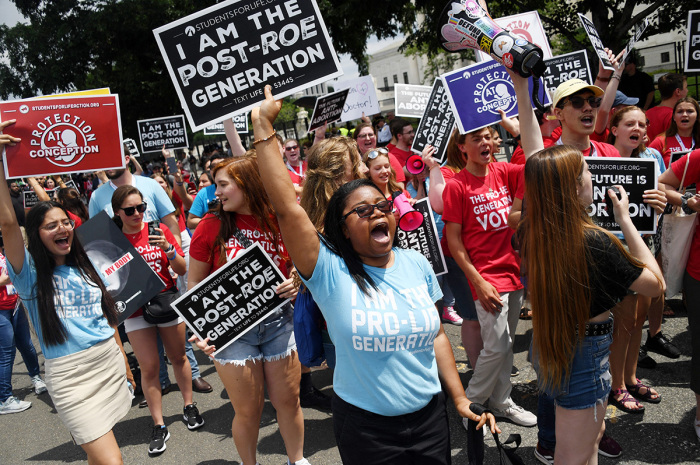Pro-choice young adults more likely to say they'll vote than pro-life counterparts: survey

Young American adults who identify as pro-life are far less likely to vote than their pro-abortion counterparts as abortion-related referendums have become more commonplace in the United States, a new report suggests.
The Kennedy School Institute of Politics at Harvard University released the results of its Fall 2023 YouthPoll, which sampled the opinions of 2,098 Americans between 18 and 29 from Oct. 23-Nov. 6.
The survey asked respondents for their views on abortion, finding that the percentage of young Americans who believe abortion should "be legal in all cases" has risen from 36% in 2016 to 44% in 2023.
Thirteen percent of young Americans think that abortion "should be permitted but subject to greater restrictions than it is now," while 23% want abortion "permitted only in cases such as rape, incest, or to save the woman's life." Eight percent favor abortion "only to save the woman's life." One out of ten (11%) young people feel that abortion "should not be permitted at all."
When asked to categorize themselves as "pro-choice" or "pro-life," 53% of respondents described themselves as "pro-choice" compared to 26% who called themselves "pro-life." Ten percent classified themselves as "neither," while 11% selected the "don't know" option.
Overall, 45% of young Americans indicated that they would "definitely" vote in a ballot referendum related to the legality of abortion should it come before them in their state. However, 64% of respondents who identified as "pro-choice" said they would "definitely" vote on a hypothetical referendum compared to 34% of their "pro-life" peers.
The pro-life movement has experienced a series of losses in ballot measures in elections since the June 2022 U.S. Supreme Court ruling that the U.S. Constitution does not contain a right to abortion. The Dobbs v. Jackson Women's Health Organization decision overturned the 1973 Roe v. Wade ruling, which legalized abortion nationwide.
Last year, voters in the overwhelmingly Democratic states of California and Vermont and the swing state of Michigan approved ballot questions establishing constitutional rights to abortion in their states.
At the same time, voters in Montana rejected a ballot measure that would have declared infants who survived botched abortions as legal persons, while a Kentucky ballot question that would have clarified that the state constitution does not contain a right to abortion failed to pass. Last summer, before the 2022 general election, voters in Kansas rejected a similar referendum.
While votes explicitly establishing constitutional rights to abortion at the state level did not succeed in any Republican-leaning states last year, that changed this year when voters in Ohio approved a ballot question establishing a right to abortion.
As a result of this year's election, Ohio became the first state with pro-life protections implemented following the Dobbs decision to pass a referendum that will nullify them.
In a phone call with members of the media ahead of the Ohio abortion referendum, the pro-life advocacy group Susan B. Anthony Pro-Life America stressed that pro-abortion advocacy groups are working to put similar measures on the ballot in Arizona, Florida, Idaho, Missouri, Nebraska, North Dakota, Oklahoma and South Dakota.
All of those states have pro-life protections that prohibit abortions at 15 weeks gestation or earlier, although some states have their pro-life laws on hold as they are tied up in court.
In addition to finding majority support for abortion among young adult Americans, the YouthPoll found the demographic places a premium on abortion access when deciding where to live.
Specifically, 62% of Americans between the ages of 18 and 29 described having "legal access to reproductive healthcare, including abortion," as either "very" or "somewhat" important when deciding what state to live in.
Forty-four percent of respondents described a state's laws regarding abortion as a "very important" factor when determining whether or not they want to live there, while 18% called a state's abortion laws a "somewhat important" consideration when making such a decision.
Following the Dobbs decision, 24 states have implemented pro-life protections. Fifteen of those states prohibit abortion throughout all nine months of pregnancy with limited exceptions, while two ban abortions after six weeks gestation, two prohibit the procedure after 12 weeks gestation, and one limits abortions to the first 15 weeks of pregnancy. The remaining four states have their pro-life laws currently tied up in court.
Ryan Foley is a reporter for The Christian Post. He can be reached at: [email protected]



























